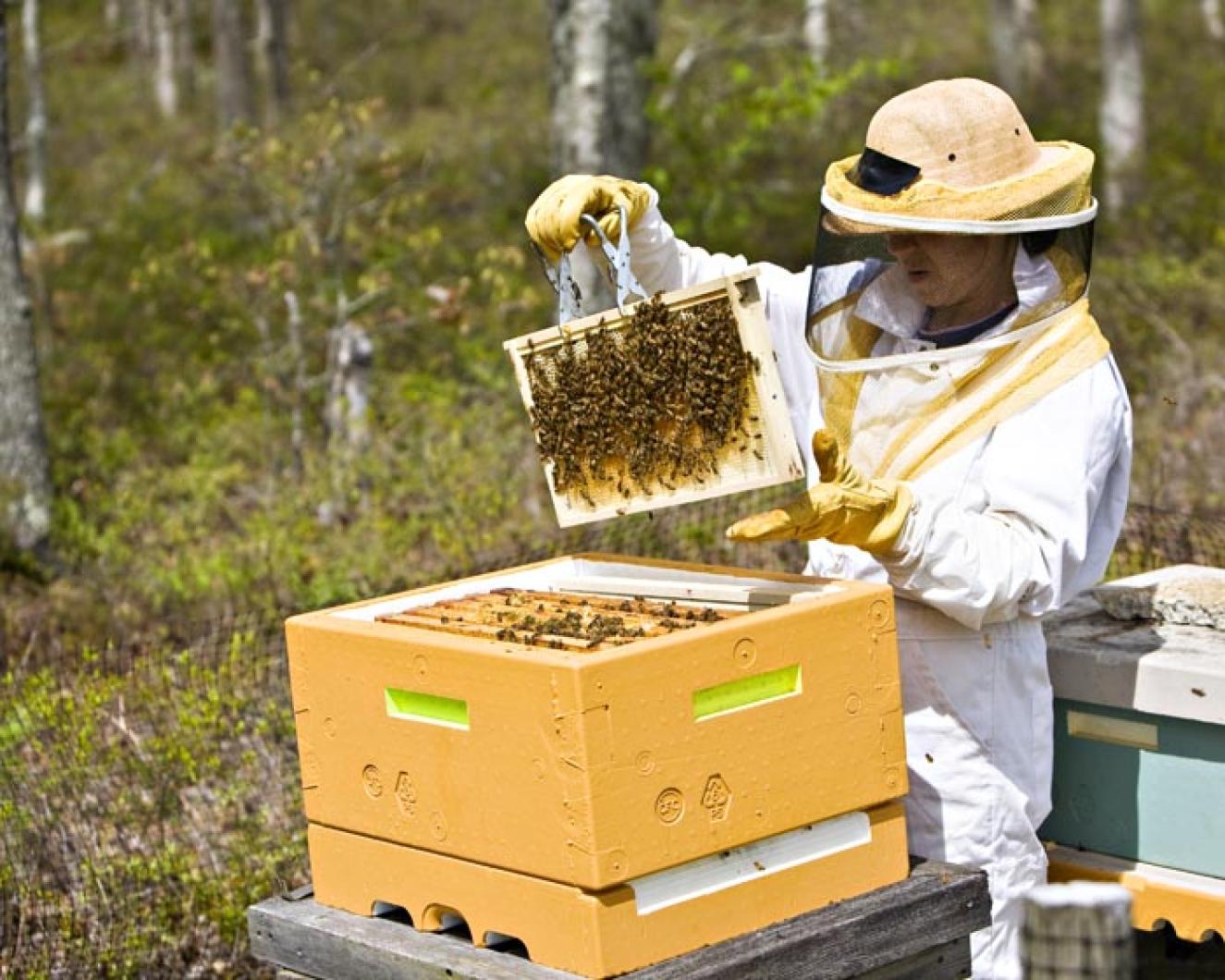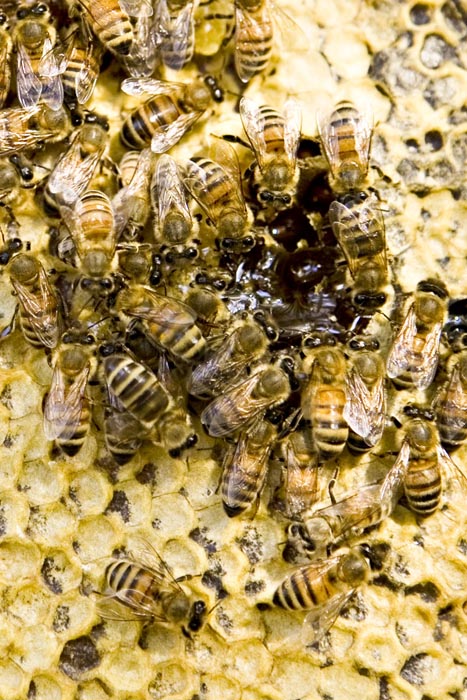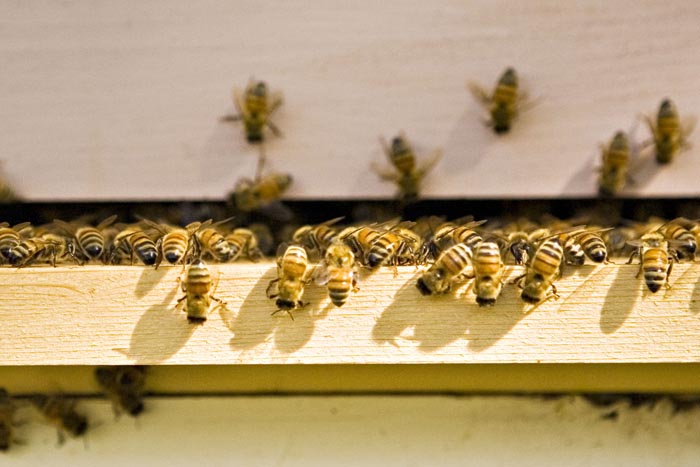E verett Zurlinden is a pollinator. He doesn’t have wings or antennae or a pollen basket as his honeybees do, but by placing his beehives in backyards and farms, Mr. Zurlinden is a pollinator by proxy.
“My philosophical view on honeybees is they’re not there for us to gather honey; it’s a nice outcome but what we [as beekeepers] are really doing is participating in the food cycle and providing pollination,” Mr. Zurlinden, owner of Beehavin’ Apiary, said this week from his home in Smithfield, R.I. “If you keep healthy bees, you’ll get honey or wax as a byproduct but the key is, we have to keep them healthy.”
Vineyarders will have the opportunity to learn how to be healthy beekeepers when Island Grown Initiative (IGI) hosts Mr. Zurlinden’s bee school this weekend at the Martha’s Vineyard Agricultural Hall in West Tisbury. Tickets are $100 and include four working sessions with Mr. Zurlinden, who is cramming a normal six-week course into two days of study.
Healthy bees mean better pollination and more abundance in crop production. Unfortunately, increasing amounts of invasive Vero mites and harmful pesticides are killing off honeybees across the country in what has been tagged colony collapse disorder, so keeping bees healthy has become increasingly difficult.
Mr. Zurlinden said just keeping them alive is the biggest challenge, but Vineyard beekeepers have a unique opportunity to keep colony collapse disorder out of their hives and off the Island.
“My goal [through the bee school] is to teach people to keep bees without pesticides,” he said. “Martha’s Vineyard has a unique opportunity because it’s closed off and can adopt a practice that allows beekeepers to keep bees in a very natural way, maybe not organic, but it will not compromise a goal to be organic if they want that opportunity.”
“If everybody does it then we don’t have anyone upsetting [the practice],” he added. “Here in Massachusetts we don’t know what our neighbors are doing, but on Martha’s Vineyard we may be able to get control of the practices and control the mite as a group. It could be really fascinating.”
Mr. Zurlinden was first introduced to bees, naturally, by being stung by a yellow jacket as a child. But it was a neighbor near his family’s farm who taught him how to tame the more even-tempered honeybees.
The young Zurlinden’s growing fascination with bees left his family perplexed. One day when Mr. Zurlinden was coming back inside from tending to the hives, dressed in his bee veil, T-shirt, shorts and work boots, his sister asked what he saw in the bees.
“Who cares, as long as he’s behavin’,” his mother replied. Beehavin’ Apiary was born in 1972.
Mr. Zurlinden described himself as “hopelessly hooked” for the next 40 years, and he has since become one of the region’s apiary experts. But with increasing threats to his hives, Mr. Zur-linden has learned which mitigation techniques work over the years. Treating beehives with chemicals to keep out the Vero mites can kill off the bees themselves, and practicing strictly organically (doing nothing at all) lets the mites feast on the bees freely. Mr. Zurlinden strives for something in the middle.
“For those that want to follow [the organic] process, that’s a choice and I encourage it,” he said. “But if you want to follow that path then you have to accept that, like any other livestock, they have a beginning and an end.”
Mr. Zurlinden prefers natural practices to control mites as best as possible. The mite holds on to the body of the bee like a tick and then falls off the bee when it’s done feasting. Mr. Zurlinden recommends placing a screen on the bottom of the hive that allows the mite to fall onto the ground but keeps it small enough so that the honeybee can’t fall through.
A healthy coating of confectioners’ sugar helps as well.
“The bees are going to say, ‘Hey this is sweet, that’s what I’m after,’ and they’ll groom each other and dislodge the mites,” he explained. “Coincidentally the sugar molecules are big enough so the mites can’t hold on. If you do that every three weeks, you’ll lower the mite count. You’re never going to get rid of the mites, but natural practices lower the count and you have a healthier hive.”
The goal throughout the beekeeping process is to keep the bees alive, and this method of integrative pest management, as Mr. Zurlinden likes to call it, has proven successful. If sugar isn’t working but the practitioner doesn’t want to use pesticides, Mr. Zurlinden said sometimes it’s best to let nature take its course and allow a hive or two to die.
“I’m hoping to use the Martha’s Vineyard group as a case study and show an 80 per cent success rate or higher here,” he added.
Newbie students will receive an overview of beekeeping and current issues from the perspective of both a backyard and commercial beekeeper, as well as a comprehensive overview of organic and chemical practices. Students also will become familiar with different types of honeybees and their adaptability to different climates.
Lastly, bee school attendees will learn about the equipment, managing the bees’ life cycle and how to extract honey products from the hive. And if Mr. Zurlinden runs out of time, he’s happy to come back.
“Every year folks on Martha’s Vineyard have been really good to me and bought bees from me,” said Mr. Zurlinden, who sells his bees to IGI’s Randi Baird and Vineyard Haven apiarist Tim Colon to name a few. “I feel socially obligated to give back.”
Ms. Baird said the buzz about beekeeping is starting to catch on not only through IGI but across the Island.
“People are catching on that there’s a real problem and the importance of bees in our food system, as well as their being so fascinating,” she said. “IGI has always known bees are central to crop production and pollination, and our mission is to support family farms. Bees are another way we can do that.”
IGI’s Bee School starts tonight at 7 p.m. at the Agricultural Hall in West Tisbury, and continues Saturday 9 a.m. to noon and 2 to 6 p.m., and Sunday noon to 3 p.m. Tickets are $50 for students and teachers and $100 for all others. Scholarships are available. To register for bee school visit islandgrown.org/pollination/ or e-mail randi@islandgrown.org.







Comments
Comment policy »